Daily Vocabulary Words: List of Daily Used Words
Hi there. Welcome to this special section @ Wordpandit.
Our endeavour here is straightforward: highlighting important daily vocabulary words, you would encounter in The Hindu. This is your repository of commonly used words; essentially, we are posting a list of daily used words. Hence, this has significant practical application as it teaches you words that are commonly used in a leading publication such as The Hindu.
Visit the website daily to learn words from The Hindu.
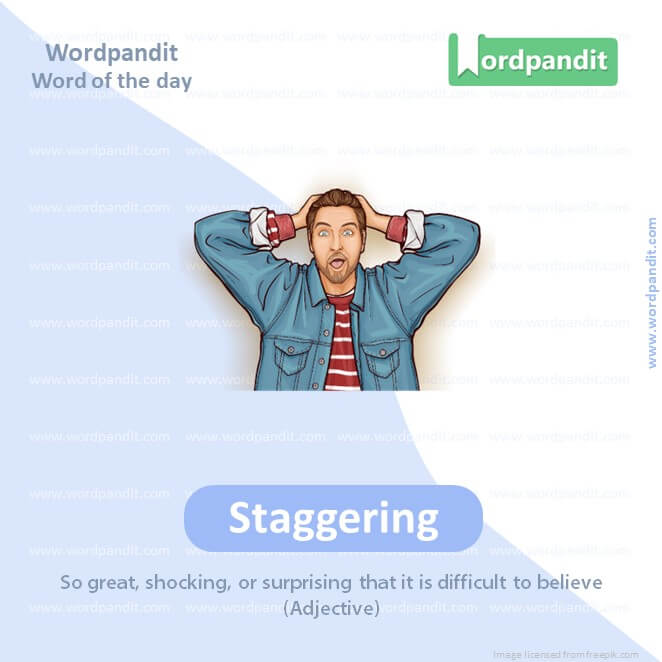
WORD-1: Staggering
CONTEXT: With a staggering 17,000 Gazans already killed since October 7, Palestine is seeing one of its greatest tragedies. The West has shockingly enabled this in various ways: it has supported Israel’s “right to defend” by reducing Palestine to Hamas; conflated critiques of Zionism and the Israeli state with anti-Semitism; weaponised the Holocaust; and attempted to erase history (the White House described Hamas’ attack as “unprovoked”).
SOURCE: The Hindu
EXPLANATORY PARAGRAPH: “Staggering” is like when you see a really big number of cookies, so many that it’s surprising. It means something is so surprising, huge, or hard to believe.
MEANING: So great, shocking, or surprising that it is difficult to believe (Adjective).
PRONUNCIATION: STAG-uh-ring
SYNONYMS: Astonishing, Overwhelming, Astounding, Shocking, Breathtaking, Stunning, Amazement
USAGE EXAMPLE:
1. The cost of the project is staggering.
2. They won by a staggering amount of votes.
3. The staggering beauty of the mountains amazed them.
4. His knowledge of history is staggering.
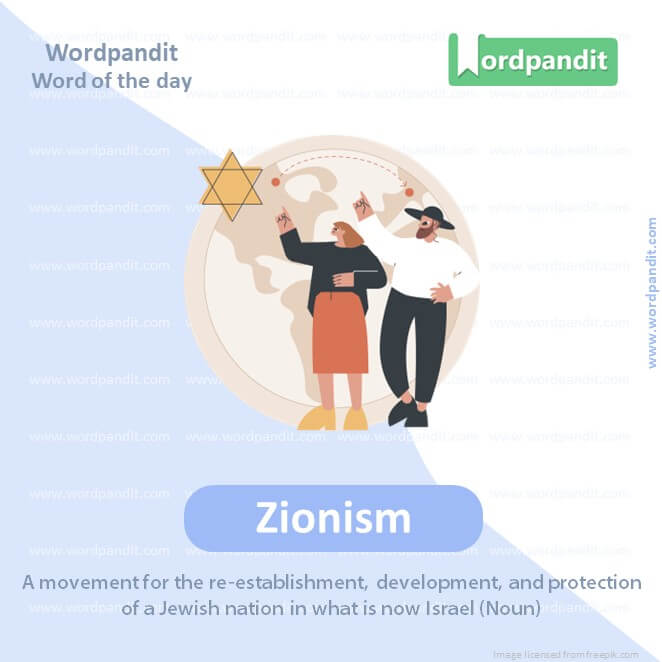
WORD-2: Zionism
CONTEXT: With a staggering 17,000 Gazans already killed since October 7, Palestine is seeing one of its greatest tragedies. The West has shockingly enabled this in various ways: it has supported Israel’s “right to defend” by reducing Palestine to Hamas; conflated critiques of Zionism and the Israeli state with anti-Semitism; weaponised the Holocaust; and attempted to erase history (the White House described Hamas’ attack as “unprovoked”).
SOURCE: The Hindu
EXPLANATORY PARAGRAPH: “Zionism” is like when people really believe in and work hard to make sure there’s a special, safe place for people who share the same history and beliefs. It’s about creating and supporting a Jewish state in what is now Israel.
MEANING: A movement for the re-establishment, development, and protection of a Jewish nation in what is now Israel (Noun).
PRONUNCIATION: ZY-uh-niz-um
SYNONYMS: Jewish nationalism, Israel advocacy, Hebrew state movement, Jewish statehood, Judaic political movement
USAGE EXAMPLE:
1. Zionism played a role in the establishment of Israel.
2. He wrote a book about the history of Zionism.
3. Zionism has influenced global politics.
4. The conference discussed various aspects of Zionism.
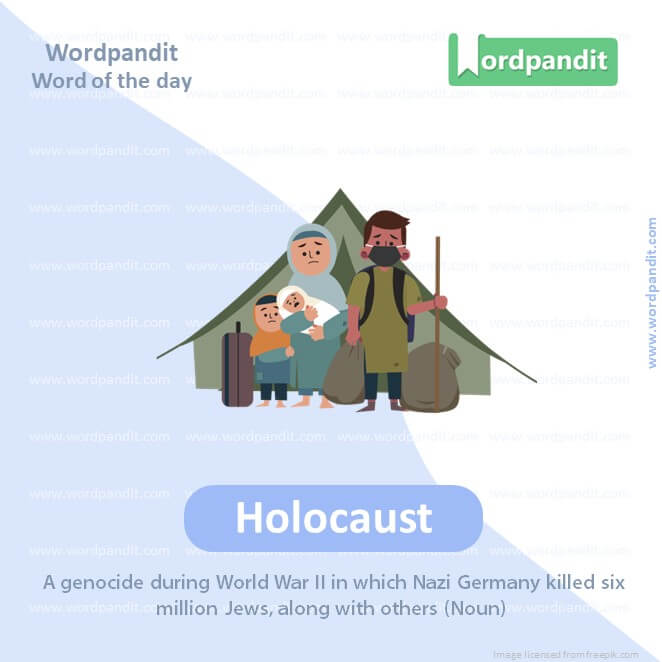
WORD-3: Holocaust
CONTEXT: With a staggering 17,000 Gazans already killed since October 7, Palestine is seeing one of its greatest tragedies. The West has shockingly enabled this in various ways: it has supported Israel’s “right to defend” by reducing Palestine to Hamas; conflated critiques of Zionism and the Israeli state with anti-Semitism; weaponised the Holocaust; and attempted to erase history (the White House described Hamas’ attack as “unprovoked”).
SOURCE: The Hindu
EXPLANATORY PARAGRAPH: “Holocaust” is a very sad word that means a time when lots and lots of people, especially Jewish people, were hurt and killed by others during a big war. It was a very terrible and unfair time.
MEANING: A genocide during World War II in which Nazi Germany killed six million Jews, along with others (Noun).
PRONUNCIATION: HOH-luh-kawst
SYNONYMS: Genocide, Mass murder, Atrocity, Extermination, Catastrophe, Tragedy, Annihilation
USAGE EXAMPLE:
1. They visited a museum dedicated to the Holocaust.
2. Her family were survivors of the Holocaust.
3. The Holocaust is a significant event in world history.
4. Books on the Holocaust help educate about the atrocities.
WORD-4: Unprovoked
CONTEXT: With a staggering 17,000 Gazans already killed since October 7, Palestine is seeing one of its greatest tragedies. The West has shockingly enabled this in various ways: it has supported Israel’s “right to defend” by reducing Palestine to Hamas; conflated critiques of Zionism and the Israeli state with anti-Semitism; weaponised the Holocaust; and attempted to erase history (the White House described Hamas’ attack as “unprovoked”).
SOURCE: The Hindu
EXPLANATORY PARAGRAPH: “Unprovoked” is like when someone suddenly decides to be mean or start a fight without any reason. It’s doing something hurtful or aggressive without being caused or threatened first.
MEANING: Occurring without any justification or cause (Adjective).
PRONUNCIATION: uhn-proh-VOKT
SYNONYMS: Unjustified, Unwarranted, Baseless, Groundless, Undeserved, Gratuitous, Unnecessary
USAGE EXAMPLE:
1. The attack was completely unprovoked.
2. He was shocked by the unprovoked criticism.
3. The unprovoked aggression alarmed the community.
4. There was an unprovoked outburst during the meeting.
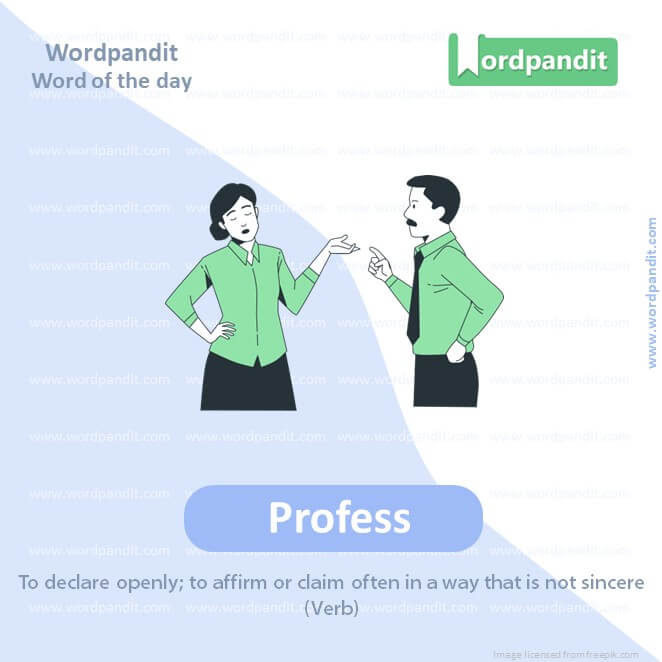
WORD-5: Profess
CONTEXT: Western societies that profess democracy have also scotched their own people’s freedom of expression — not with official diktats but by demonising and targeting citizens speaking in support of Palestine. Western universities have become the major ground for this. In Ivy League institutions such as Harvard and Columbia, the private details of students who signed pro-Palestine letters have been made public.
SOURCE: The Hindu
EXPLANATORY PARAGRAPH: “Profess” is like when you stand up and say something you really believe or know a lot about, like if you said, “I’m great at painting!” It means to declare something confidently.
MEANING: To declare openly; to affirm or claim often in a way that is not sincere (Verb).
PRONUNCIATION: pruh-FESS
SYNONYMS: Declare, Proclaim, Announce, Assert, Affirm, Avow, State
USAGE EXAMPLE:
1. He professed his love for her.
2. She professed to be an expert in the field.
3. He professed innocence despite the evidence.
4. They professed a commitment to quality.
WORD-6: Scotched
CONTEXT: Western societies that profess democracy have also scotched their own people’s freedom of expression — not with official diktats but by demonising and targeting citizens speaking in support of Palestine. Western universities have become the major ground for this. In Ivy League institutions such as Harvard and Columbia, the private details of students who signed pro-Palestine letters have been made public.
SOURCE: The Hindu
EXPLANATORY PARAGRAPH: “Scotched” is like when you stop a rumor or false story from spreading, like telling everyone the truth when someone says something that’s not true. It means putting an end to something or stopping it from happening.
MEANING: Ended, disproved, or rendered harmless (Verb).
PRONUNCIATION: SKOTCHT
SYNONYMS: Quashed, Squashed, Thwarted, Halted, Disproved, Nullified, Ended
USAGE EXAMPLE:
1. The rumors were scotched by the official statement.
2. They scotched the plans for the new development.
3. The idea was scotched before it could take off.
4. The police scotched the spread of false information.
WORD-7: Diktats
CONTEXT: Western societies that profess democracy have also scotched their own people’s freedom of expression — not with official diktats but by demonising and targeting citizens speaking in support of Palestine. Western universities have become the major ground for this. In Ivy League institutions such as Harvard and Columbia, the private details of students who signed pro-Palestine letters have been made public.
SOURCE: The Hindu
EXPLANATORY PARAGRAPH: “Diktats” are like orders from a teacher that you have to follow, like “Everyone must sit down now.” It means strict orders or rules that you must obey without question.
MEANING: Authoritative decrees or orders, especially ones that are harsh and unchallengeable (Noun).
PRONUNCIATION: dik-TAHTS
SYNONYMS: Decrees, Edicts, Commands, Mandates, Directives, Orders, Rules
USAGE EXAMPLE:
1. The government issued new diktats on trade.
2. He refused to follow the company’s diktats.
3. The diktats from the headquarters were strict.
4. People were unhappy with the authoritarian diktats.
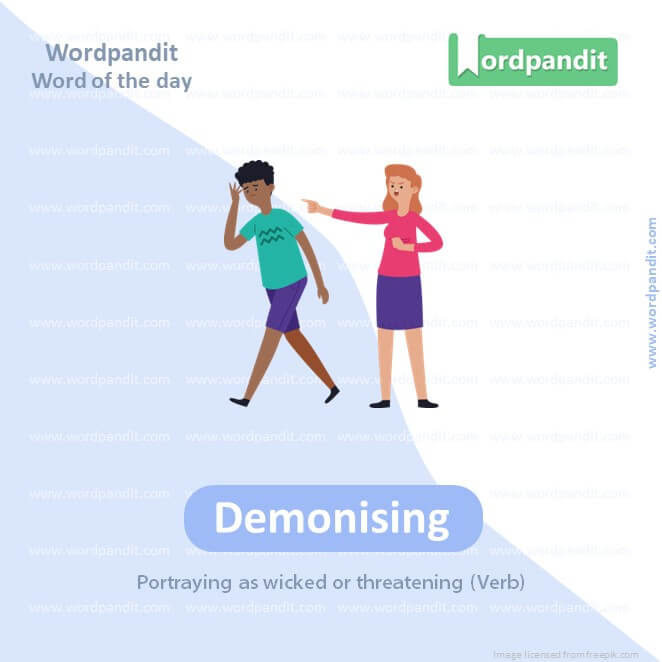
WORD-8: Demonising
CONTEXT: Western societies that profess democracy have also scotched their own people’s freedom of expression — not with official diktats but by demonising and targeting citizens speaking in support of Palestine. Western universities have become the major ground for this. In Ivy League institutions such as Harvard and Columbia, the private details of students who signed pro-Palestine letters have been made public.
SOURCE: The Hindu
EXPLANATORY PARAGRAPH: “Demonising” is like when someone is made to look very bad or evil, just like a scary monster in a story. It’s when you make someone or something seem very bad or harmful.
MEANING: Portraying as wicked or threatening (Verb).
PRONUNCIATION: DEE-muh-ny-zing
SYNONYMS: Vilifying, Denigrating, Disparaging, Dehumanizing, Blackening, Slandering, Defaming
USAGE EXAMPLE:
1. The media was accused of demonising the leader.
2. He was demonised by his political opponents.
3. The novel was criticized for demonising its characters.
4. They are often unfairly demonised in the press.
WORD-9: Prominent
CONTEXT: Prominent Jewish donors (and supporters of the Israeli state) have withdrawn funding from universities including Harvard and Pennsylvania alleging inaction against anti-Semitism and anti-Israel speeches on campuses (note: 45% of Harvard’s revenue of $5.8 billion in 2022 came from philanthropy).
SOURCE: The Hindu
EXPLANATORY PARAGRAPH: “Prominent” is like being the tallest kid in your class or the biggest picture on a page. It means something is very noticeable or important.
MEANING: Standing out or easily noticeable; important or well-known (Adjective).
PRONUNCIATION: PROM-uh-nuhnt
SYNONYMS: Distinguished, Conspicuous, Notable, Eminent, Outstanding, Remarkable, Well-known
USAGE EXAMPLE:
1. She is a prominent figure in the art world.
2. The building has a prominent location in the city.
3. He played a prominent role in the campaign.
4. The issue has gained prominent attention.
WORD-10: Philanthropy
CONTEXT: Prominent Jewish donors (and supporters of the Israeli state) have withdrawn funding from universities including Harvard and Pennsylvania alleging inaction against anti-Semitism and anti-Israel speeches on campuses (note: 45% of Harvard’s revenue of $5.8 billion in 2022 came from philanthropy).
SOURCE: The Hindu
EXPLANATORY PARAGRAPH: “Philanthropy” is like when you help others by giving your toys or time. It’s when someone gives money or help to others to make the world a better place.
MEANING: The desire to promote the welfare of others, often expressed by the generous donation of money to good causes (Noun).
PRONUNCIATION: fuh-LAN-thruh-pee
SYNONYMS: Charity, Benevolence, Generosity, Humanitarianism, Altruism, Kindness, Social conscience
USAGE EXAMPLE:
1. He is known for his philanthropy.
2. The organization relies on philanthropy to operate.
3. Her philanthropy has helped many people.
4. They established a foundation for philanthropy.
Vocabulary Pronunciation
The dance of language learning comprises two inseparable partners: vocabulary and pronunciation. The rhythm of this dance is best enjoyed when both partners are in sync. Essentially, mastering ‘vocabulary pronunciation’ is key to expressing and understanding a language effectively. However, what is the ideal approach to learn ‘vocabulary pronunciation’?
Firstly, the process of learning ‘vocabulary pronunciation’ isn’t a sprint. Rather, it’s a marathon where consistency is vital. A gradual and steady pace of learning new words and their pronunciation offers enough time to effectively practice and commit them to memory.
Secondly, to master ‘vocabulary pronunciation’, go beyond written text. Dwell in the world of audible language, such as documentaries, podcasts, music, or language-learning apps that provide pronunciation guides. These memorable auditory experiences aid in refining your ‘vocabulary pronunciation’ and offer a glimpse into the authentic sounds of the language.
Another beneficial strategy for learning ‘vocabulary pronunciation’ involves the use of phonetic transcriptions. They offer systematic approaches to understanding the sound system of a language, thereby improving pronunciation.
Most importantly, do not shy away from practicing your ‘vocabulary pronunciation’. Be it in a language exchange meeting, a conversation with a native speaker, or even a self-recording session, active verbalization massively boosts your pronunciation prowess.
Lastly, always remember to train your ears as much as you train your tongue. Listening carefully to native speakers helps you capture the subtleties of ‘vocabulary pronunciation’, contributing to better delivery when you speak.
In conclusion, mastering ‘vocabulary pronunciation’ is not an overnight journey. It’s a process of intentional practice, sustained listening, conscientious reflection and active usage. As you chart this course with diligence and patience, you will witness your ‘vocabulary pronunciation’ skills blossom, leading you to communicate with greater fluency and confidence.







